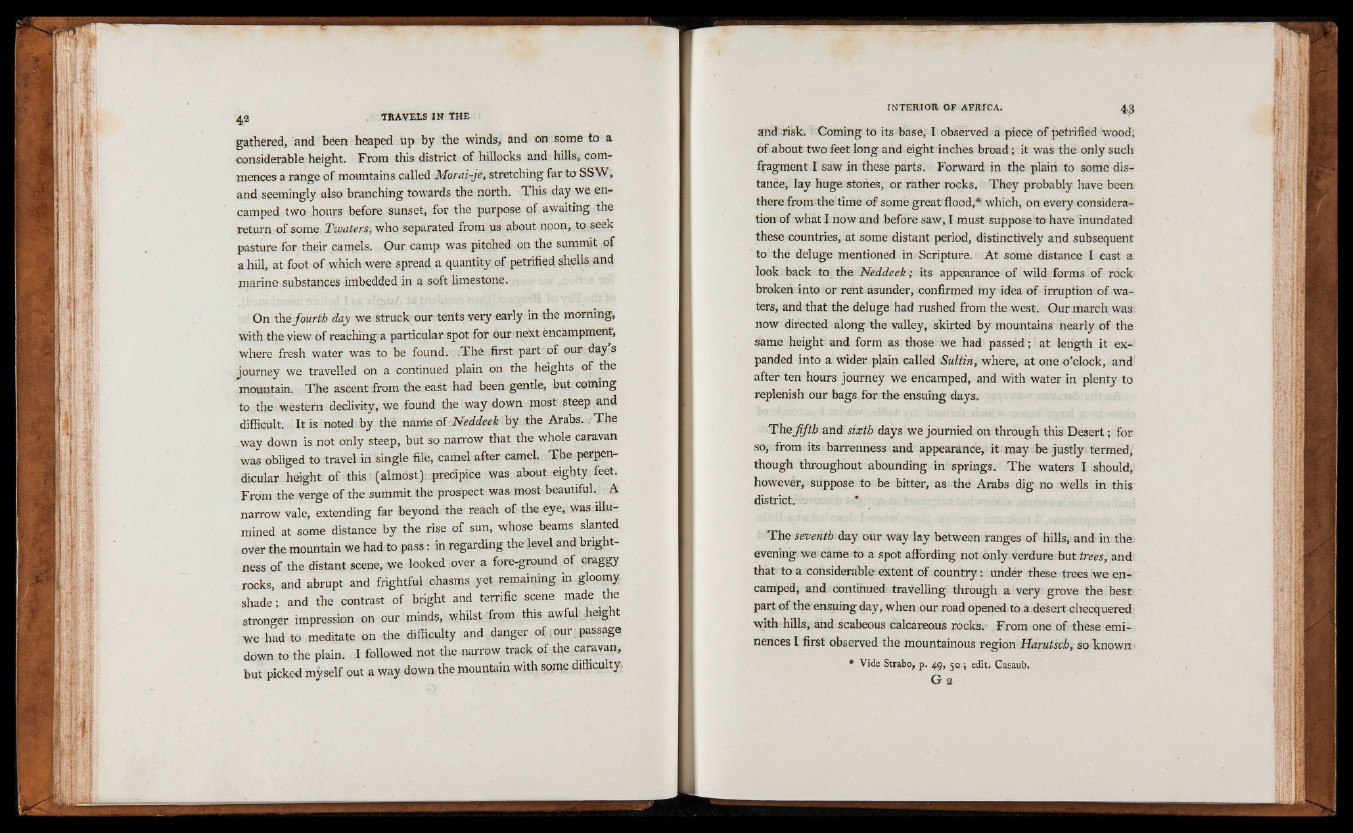
gathered, arid been heaped up by the winds, and on some to a
considerable height. From this district of hillocks and hills, commences
a range of mountains called Morai-je, stretching far to SSW,
and seemingly also branching towards the north. This day we encamped
two hours before sunset, for the purpose of awaiting the
return of some Twaters, who separated from us about noon, to seek
pasture for their camels. Our camp was pitched on the summit of
a hill, at foot of which were spread a quantity of petrified shells and
marine substances imbedded in a soft limestone.
On the fourth day we struck our tents very early in the morning,
with the view of reaching a particular spot for our next encampment,
where fresh water was to be found. The first part of our days
journey we travelled on a continued plain on the heights of the
mountain. The ascent from the east had been gentle, but coming
to the western declivity, we found the way down most steep and
difficult. It is noted by the name oiNeddeek by the Arabs. . The
jway down is not only steep, but so narrow that the whole caravan
was obliged to travel in single file, camel after camel. The perpendicular
height of this: (almost), precipice was about eighty feet.
From the verge of the summit the prospect was most beautiful. A
narrow vale, extending far beyond the reach of the eye, was illumined
at some distance by the rise of sun, whose beams slanted
over the mountain we had to pass: in regarding the level and brightness
of the distant scene, we looked over a fore-ground of craggy
rocks, and abrupt and frightful chasms yet remaining in gloomy
shade; and the contrast of bright and terrific scene made the
stronger impression on o u r minds, whilst from this awful height
we had to meditate on the difficulty and danger of our passage
down to the plain. I followed not the narrow track of the caravan,
but picked myself out a way down the mountain with some difficulty
and risk. Coming to its base, I observed a piece of petrified wood,
of about two feet long and eight inches broad; it was the only such
fragment I saw in these parts. Forward in the plain to some distance,
lay huge stones, or rather rocks. They probably have been
there from-the time of some great flood,* which, on every consideration
of what I now and before saw, I must suppose to have inundated
these countries, at some distant period, distinctively and subsequent
to the deluge mentioned in Scripture. At some distance I cast a
look back to the Neddeek; its appearance of wild forms of rock
broken into or rent asunder, confirmed my idea of irruption of waters,
and that the deluge had rushed from the west. Our march was
now directed along the valley, skirted by mountains nearly of the
same height and form as those we had passed; at length it expanded
into a wider plain called Sultin, where, at one o'clock, and
after ten hours journey we encamped, and with water in plenty to
replenish our bags for the ensuing days.
The.fifth and sixth days we journied on through this Desert; for
so, from its barrenness and appearance, it may be justly termed,
though throughout abounding in springs. The waters I should,
however, suppose to be bitter, as the Arabs dig no wells in this
district. . *
The seventh day our way lay between ranges of hills, and in the
evening we came to a spot affording not only verdure but trees, and
that to a considerable extent of country: under these trees we encamped,
and continued travelling through a very grove the best
part of the ensuing day, when our road opened to a desert checquered
with hills, and scabeous calcareous rocks. From one of these eminences
I first observed the mountainous region Harutsch, so known
* Vide Strabo, p. 49, 50 ; edit. Casaub.
G 2